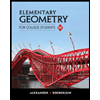
Concept explainers
Whether
Answer to Problem 9PSB
No,
Explanation of Solution
Given Information: Angle
Formula Used:The sum of all the angle of the triangle is
Proof: Any triangle is said to be acute angle triangle, if all three angles are acute.
If any of the angle is not acute, then triangle would not be acute. Therefore, if two angles are acute, then it is not necessary that third angle would be acute.
For e.g. In
Then from the triangle property (sum of all the angle of the triangle is
Hence,
Chapter 1 Solutions
Geometry For Enjoyment And Challenge
Additional Math Textbook Solutions
Introductory Statistics
College Algebra (7th Edition)
A First Course in Probability (10th Edition)
Pre-Algebra Student Edition
A Problem Solving Approach To Mathematics For Elementary School Teachers (13th Edition)
- 39 Two sides of one triangle are congruent to two sides of a second triangle, and the included angles are supplementary. The area of one triangle is 41. Can the area of the second triangle be found?arrow_forwardA parallelogram with an area of 211.41 m^2 hast a base Thatcher measures 24.3m. Find ist height.arrow_forwardBH is tangent to circle A and DF is a diameter. I don't know where to go from here. May you help please?arrow_forward
 Elementary Geometry For College Students, 7eGeometryISBN:9781337614085Author:Alexander, Daniel C.; Koeberlein, Geralyn M.Publisher:Cengage,
Elementary Geometry For College Students, 7eGeometryISBN:9781337614085Author:Alexander, Daniel C.; Koeberlein, Geralyn M.Publisher:Cengage, Elementary Geometry for College StudentsGeometryISBN:9781285195698Author:Daniel C. Alexander, Geralyn M. KoeberleinPublisher:Cengage Learning
Elementary Geometry for College StudentsGeometryISBN:9781285195698Author:Daniel C. Alexander, Geralyn M. KoeberleinPublisher:Cengage Learning

